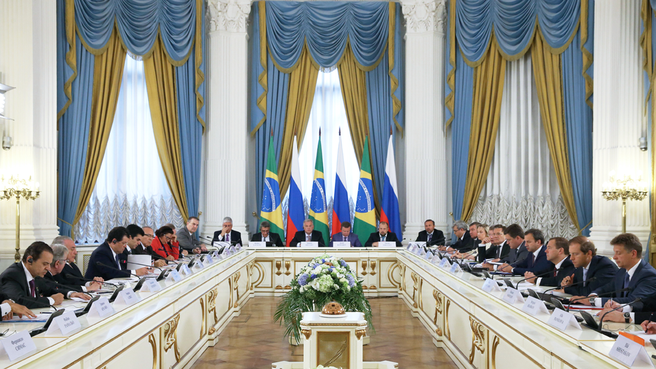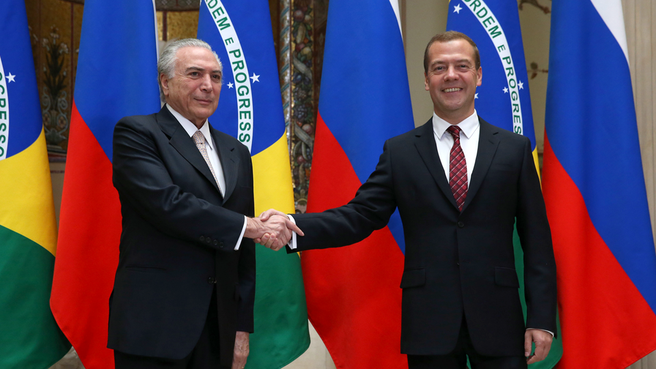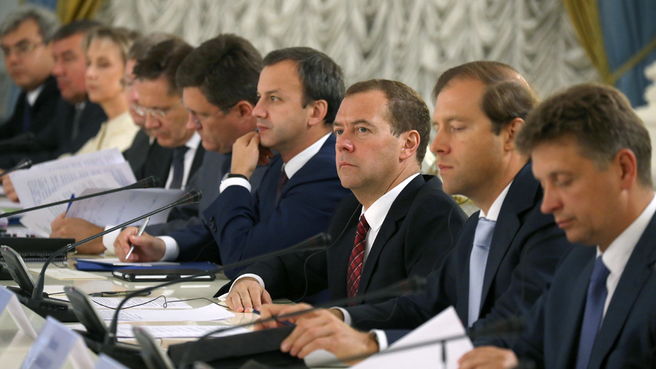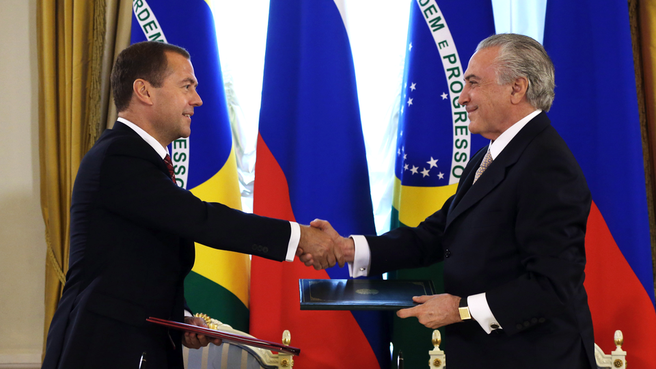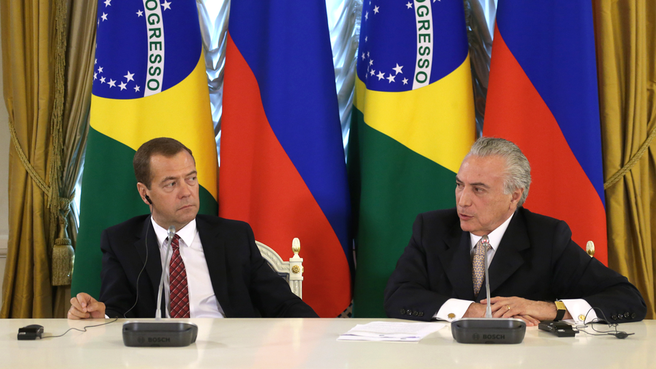The agenda included measures for further strengthening bilateral trade, economic, investment, military-technical, energy, aerospace, agricultural, research and cultural cooperation.
Opening remarks by Dmitry Medvedev
Documents signed at the meeting
Opening remarks by Dmitry Medvedev:
Seventh meeting of the Russian-Brazilian High-Level Commission on Cooperation
Good afternoon Mr Vice President, Brazilian colleagues,
Today, we are holding the seventh meeting of the Russian-Brazilian High-Level Commission on Cooperation. This is not the first day your representative delegation has been at work. Yesterday, a meeting of an intergovernmental commission and a Russian-Brazilian business forum took place, as we just noted during our narrow-format meeting. Now we’ll continue to work in an expanded format and address specific issues – cooperation in trade, energy, industry, agriculture, science and culture.
Brazil is our strategic partner in Latin America. Our relations are based on a long history, mutual respect and trust. We have a shared vision of the current situation in international relations. We work together in various international formats, including BRICS and closely cooperate in multilateral formats, such as the G20, the World Trade Organisation and naturally, the UN.
It is important, however, that our mutual understanding on the political level be backed up by diversified trade and economic cooperation. As Mr Vice President and we have just stated, in recent years, bilateral trade has been growing at a good pace, and even despite certain fluctuations at present we can see this as good progress toward the level that we have planned to achieve -- $10 billion in trade turnover.
I would also like to note a certain qualitative shift. Recently, we set the goal of making a transition (and this transition is already underway) from the direct supply of raw materials both ways to the exchanges of industrial and high-tech goods, which, in our opinion, is very important.
Today, we will consider a number of infrastructure projects and address specific areas of cooperation. I will not dwell on this so as not to steal the spotlight from our colleagues, ministers who represent our two countries here. In any case, I am sure that enthusiastic efforts within the framework of the seventh meeting of our Russian-Brazilian high-level commission will invigorate cooperation and take it to a new level.
Documents signed at the seventh meeting of the Russian-Brazilian High-Level Commission on Cooperation:
– A contract for the stationing and operation of an SM-GLONASS automatic measuring station on the territory of the Federative Republic of Brazil, signed between Precision Instrument-Making Systems, a scientific and production corporation, and Federal University of Santa Maria;
- a memorandum of mutual understanding between Rosatom State Atomic Energy Corporation and Nuclebrás Equipamentos Pesados (NUCLEP);
- the final act of the ninth session of the Intergovernmental Russian-Brazilian Commission on Trade, Economic, Scientific and Technological Cooperation;
- a joint statement on the results of the seventh meeting of the Russian-Brazilian High-Level Commission on Cooperation.
Joint news conference with Dmitry Medvedev and Michel Temer on the results of the meeting of the Russian-Brazilian High-Level Commission on Cooperation
Transcript:
Dmitry Medvedev: Ladies and gentlemen,
We have just held the seventh meeting of our Russian-Brazilian High-Level Commission. We had intensive, friendly and productive talks with Vice President Michel Temer. Members of our governments took part in these talks. We discussed in detail the current state of affairs and prospects for bilateral ties, and came to the conclusion that by and large, we are doing fairly well in all areas. We achieved considerable progress since the commission’s previous meeting in Brasilia in 2013.
What would I like to say about the results of our talks at the commission’s meeting? First, Brazil remains our leading trade, economic and strategic partner in Latin America. Recently, we have substantially consolidated our ties for a number of reasons. Thus, Brazil has become one of our major suppliers of agricultural and food products.
Last year our trade reached $6.3 billion and continued growing compared to 2013. This year there were some fluctuations, some of which are linked with raw material prices and the economic situation, but we have good potentialities for restoring the growth rates we had before.
Our main goal is to reach the targets we have mapped out. They are set in our joint statements, including those by our two presidents, Vladimir Putin and Dilma Rousseff. They mentioned that we would like to bring our trade to the high level of $10 billion. I think this is an entirely realistic figure.
We discussed the development of our trade and economic cooperation in the most diverse areas, such as machine-building, infrastructure, power industry, hydrocarbon production, the nuclear industry (as reflected in a protocol), the pharmaceutical industry and metallurgy, to name a few.
Naturally, we should continue diversifying our trade, laying special emphasis on the manufacturing of products with high added value and on investment cooperation. We have made a special statement on this score. Even in such an important area as our trade in food and agricultural products, we should switch from a direct exchange of products to the establishment of joint ventures on their processing. This is an important area as well.
A Russian-Brazilian Economic Forum was held yesterday. It went very well. Most importantly, its major participants – companies from Russia and Brazil – showed deep interest in it as they discussed investment cooperation. Both our countries boast fast-growing economies and focus on promising areas of cooperation, including nuclear energy, which I already mentioned, and space exploration, which was also widely discussed today. We hope that these two areas of cooperation will eventually form the basis of the Russian-Brazilian technical alliance. We agreed to promote cooperation in drafting bilateral documents, because such major partners as Russia and Brazil should have a reliable regulatory framework. A series of documents have already been signed. Other documents are almost ready for signing or await ratification. We hope that in the near future we will be able to speed it up in order to have these decisions adopted.
We discussed our relations in the sphere of culture and education, promotion of student exchanges and youth contacts, training issues and student cooperation. This is our future. We agreed that we will closely monitor these processes.
We have special landmark projects. For example, this year marks the 15th anniversary of the Bolshoi Theatre’s only foreign ballet school, located in the Brazilian city of Joinville. This is a one-of-a-kind project and the crown jewel of Russian-Brazilian cooperation and friendship. We discussed ways to promote such projects. We may open a club for sambo, a Russian martial art, in Brazil under the same arrangements.
In general, we are willing to promote our cooperation across all areas of culture and education.
Both our peoples love sport. Russia and Brazil are hosting major international sporting events almost at the same time. First, we had the Winter Olympics and then Brazil hosted the FIFA World Cup. In 2016, the Summer Olympic Games will take place in Rio de Janeiro. In 2018, Russia will host the FIFA World Cup. Our respective cities also host Student Games. Brasilia and Krasnoyarsk will be the venues for the World University Games. We have plenty of sports activities. There are things to see, discuss and learn from each other.
In closing, I would like to thank the Vice President for an open, truly partner-like and focused dialogue. We agreed that we will keep this up and, if necessary, expand it. I would like to thank all of our Brazilian and Russian colleagues for their work. I’m confident that implementing our agreements will strengthen our relations, which are already good and open. Thank you.
MichelTemer(viainterpreter): I would like to emphasise that during these three days we held a variety of events and meetings, including meetings between Russian officials and Brazilian businesspeople, as well as Russian entrepreneurs and Brazilian officials. Hopefully, all of this will further strengthen our economic ties.
I would like to point out once again that this is the third meeting that we are holding with me serving as vice president of the republic. During this time, we have held a great amount of political dialogues. We joined our efforts with Russia to do our best to reform the international relations system in general. We also worked to expand our economic cooperation and trade. Our accomplishments give us hope that we will achieve our goal and reach the level of $10 billion in our bilateral trade.
We have gone through a period of major social reforms in our respective countries. In Brazil, the middle class has grown to 40 million people, and we hope that it will continue to grow. A lot depends on what kind of education services we can provide and on expanding our cooperation with Russia in order to give our students access to modern training in the most sought-after specialities, and how we can reciprocate to Russia for providing this important service to us.
Therefore, we believe that the things we have outlined today are of great importance for Russia and Brazil. I hope that the media will appreciate our efforts. They will also have an opportunity to assess our future cooperation in equipping our respective media with the Russian GLONASS system, and other areas of our cooperation in outer space, in particular, our joint projects with Roskosmos (Federal Space Agency) and Rosatom State Nuclear Energy Corporation in the sphere of peaceful use of nuclear energy. I would like to assure Your Excellency that this is not just a government policy in Brazil (although this is our duty), but developing nuclear energy for peaceful purposes is a goal for our businesspeople and our entire nation, as it holds promise for further development of our energy industry and our economy in general.
In addition, we discussed the need to increase exports of Brazilian beef (and associated equipment, such as refrigerators), and building meat-packing plants for Russian exports, which is particularly important for Brazil given the share of agriculture and livestock production in our economy. I would also like to mention the importance of Russian supplies of advanced equipment, in particular, helicopters to Brazil. We have been negotiating further deliveries of helicopters and spare parts, as well as related services, for a while now, and we hope that these negotiations will come to a successful completion in the near future.
We also discussed our cooperation in mining, power engineering, fishing and tourism, as the tourist flow between our countries is on the rise. We noted that it’s important for Brazilian youth to learn Russian not only to be able to travel to Russia, but to have access to Russian research and education.
All of this is interrelated and is part of our relations. Of course, we discussed the organisation of major international sporting events with the Russian Prime Minister. Both our countries have considerable experience in these matters. We hope that successful hosting of various championships and the Olympic Games will serve us well in organising such events in the future. I believe that both the World Cup and the Olympic Games will be huge successes. The Russian side has given us a lot of its time, both at the institutional and at the individual levels. Thank you very much.
Question: Rossiya TV network. A question to the Russian prime minister. Mr Medvedev, how do you see the future of BRICS? Are you satisfied with cooperation between Russia and Brazil in the framework of this organisation? What is your view of the prospects for economic interaction in this association? Thank you.
Dmitry Medvedev: We devoted this day to our bilateral cooperation, but, indeed, both Russia and Brazil are members of international associations and organisations, including an interesting association such as BRICS.
As the song goes, I remember how it all began. It was not very long ago, and at that time BRICS (then, BRIC) was perceived as a club of rapidly developing economies that had little in common, but that were watched with growing attention. Today, following South Africa’s accession, BRICS turned quickly from such a club into a platform for addressing major issues faced by countries with similar positions on a number of global economic development and foreign policy trends. Today, it has become a very effective venue where we can coordinate our positions on various issues, as we did at the Ufa summit, where various issues were discussed, including economic cooperation.
Why is this important? The world is going through a period of instability. Obviously, there is high volatility on capital markets, problems are arising, all sorts of situations are developing that are not very comfortable for us and decisions are being made that do not quite suit us. It is essential to discuss all of this and work out a consolidated position as far as possible and present this position at various international platforms (say, the G20 forum).
In addition, there is a possibility to implement joint projects. To this end, we are establishing a joint bank. We agree on contingency reserve arrangements, which under certain circumstances should also safeguard our economies from unfavourable external factors and other risks.
So I highly assess our cooperation – cooperation between Russia and Brazil on the BRICS platform, as well as on other international platforms.
Question (via interpreter): I represent the Sao Paolo economic news channel. How do you view prospects for cooperation in the currency sphere? It seems to us that financial settlements in national currencies would be conducive to promoting relations between our countries.
Another question. Obviously, the value of the dollar will continue to rise in the foreseeable future. Are Brazil and Russia aware of any risks related to the constant rise in the value of the dollar, which leads to higher loan interest rates in dollar terms?
Michel Temer (via interpreter): I believe that Russia and Brazil are ready for some economic restructuring. Both Brazil and Russia are considering measures that should be taken to overcome these difficulties. We have already taken some measures and are now considering what to do next. Regarding the use of national currencies, there are also certain difficulties here, which our countries’ central banks should discuss among themselves. During the talks with the Russian prime minister, I pledged to hold a number of consultations to elicit the opinion of our financial agencies as to what exactly needs to be done to make our economic exchange more effective. As you know, a great deal in our countries depends on the position of the central bank. It formulates our financial policy. Unfortunately, it is not formulated by the government as such.
Dmitry Medvedev: I will add a few words to what Mr Vice President has said.Since the financial instability began in late 2008, all states, as well as, naturally, members of the G20, after its inaugural leaders’ summit, have been thinking about ways to strengthen the financial component of the economic world order. Naturally, we also are thinking.
How could this be done? There are several options. We believe that it is absolutely right to increase the number of reserve currencies to reduce our dependence on leading reserve currencies, be it the US dollar, the euro, or some other reserve currencies, which are not many. This is why the expansion in the number of reserve currencies is beneficial for the global economy and national economies. However, this cannot be done overnight, although we are observing various trends that can lead to the appearance of new reserve currencies. We are also thinking about this, but of course, the present situation is not very favourable for our country.
Another way to protect ourselves against foreign trade factors, fluctuations in the prices of a number of basic goods or possible political forms of pressure is to transition to financial settlements in national currencies. This is not easy, as Mr Vice President said, but quite possible. This is evident from our experience in currency relations with a number of other countries. China actively uses this form of cooperation. I believe that we can review the prospects for cooperation with the use of the rouble and the Brazilian real in our relations. This would certainly safeguard us against fluctuations on reserve currency markets – at any rate, it would alleviate the effects of such fluctuations. We will definitely continue to work along these lines, as my colleague Mr Vice President has just said.
Thank you.
